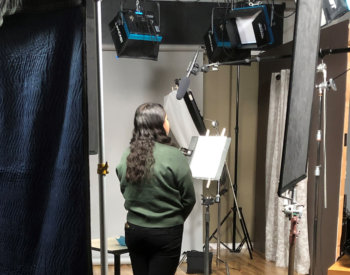Project YES offers free, confidential, online mental health resources to teens
Teens across San Antonio and South Texas can improve their mental health while helping others through an online program introduced this spring.
Project YES (Youth Empowerment & Support) is an innovative approach to helping adolescents address common mental health conditions. The program has been shown to reduce depression and anxiety, decrease hopelessness and boost a sense of control in adolescents ages 11 through 17 by more than 50%. The program is free, available online and participation is anonymous.
The program is offered through UT Teen Health, an adolescent health and wellness program at UT Health San Antonio.
The program was initiated at Stony Brook University in New York. UT Teen Health, under the leadership of Kristen Plastino, MD, professor of obstetrics and gynecology, is expanding the program to South Texas with the goal of tailoring it to local youth, including those of Hispanic, Black and indigenous descent. The project is funded through a $260,000 contract awarded in November by the city of San Antonio.
Local teens help build Project YES
 A high school student records her story at UT Health San Antonio for the local version of Project YES. The program is open to all, free of charge.
A high school student records her story at UT Health San Antonio for the local version of Project YES. The program is open to all, free of charge.
To initiate the program locally, area youth were invited to share their stories about stress and anxiety. Their voice recordings explain the concepts of the program and provide examples that are relatable to South Texas youth. Project YES is available in English and Spanish.
Teens may choose to participate in up to three modules that address different mental health issues. The modules offer scientific evidence, suggest healthy ways of coping and ask students to offer their best advice to other teens.
“There are three steps,” explained Project YES Program Manager Jennifer Todd, JD, RN. “Try an activity, tell us what you think about it and then share your advice.”
“We currently have 16 school districts and 23 community partners participating in Project YES, and we have trained 80 school and community partners in the program,” she added. The link to the program is available to anyone.
Mental health research
According to the U.S. Centers for Disease Control and Prevention, only 20% of children with mental health difficulties have access to treatment, and of those 20%, only 1 in 5 complete the full course of treatment. With continuing shortages of mental health professionals in Texas and nationwide, especially in rural areas, there are not enough providers to offer evidence-based treatment. The “open access” approach of Project YES makes treatment convenient for families and confidential for teens.
Based on Project YES research published in the journal JMIR Mental Health (DOI:10.2196/20513) in May 2020, teens’ hopelessness showed a 62% chance of decreasing, their perceived control showed a 64% chance of improving and the adolescents’ self-hatred showed a 55% chance of decreasing.
Pandemic increases mental health concerns for all
Mental health issues in adolescents were prevalent before the COVID-19 pandemic,” said Dr. Plastino, who also serves as vice chair for clinical operations in the Joe R. and Teresa Lozano Long School of Medicine.
“Teen pregnancy prevention and the physical ailments of health are often interrelated with behavioral health. And now that we’ve been going through this pandemic, we are more aware of the stresses and anxieties that our kids have been going through or that have gotten worse during this time,” she said.
The pandemic caused financial hardship, social isolation and distress resulting in increased risk for adolescent depression. One of the teens who volunteered to share her story for Project YES is Alyssa (last name is not used to protect her anonymity). Here is her story:
“It isn’t too much to say that this has been extremely hard as a kid. This year has been filled with tests, trials and heartbreak. This year I watched kids protest for human rights, watched my best friends look depression in the eye, watched my stepfather slowly lose his job….We fought this year all while having to write essays and sit through Zoom calls. Stressful is only the beginning to what we truly feel.”
Advice for parents
Dr. Plastino encourages parents to really listen to their children and invite them to share their feelings and concerns with them without judgement. “Try to instill hope in your children and make sure you are doing OK. I don’t think it would hurt us adults to click on the link to Project YES to see if it can help us, too.”
To contact UT Teen Health, visit https://www.utteenhealth.org or call 210-567-7036.
The UT Teen Health Clinic focuses on gynecology, behavioral health and overall health for adolescents. The clinic is located on the Robert B. Green Campus of University Health, hospital partner of UT Health San Antonio, at 903 W. Martin Street in downtown San Antonio. The phone number is (210) 358-8255.